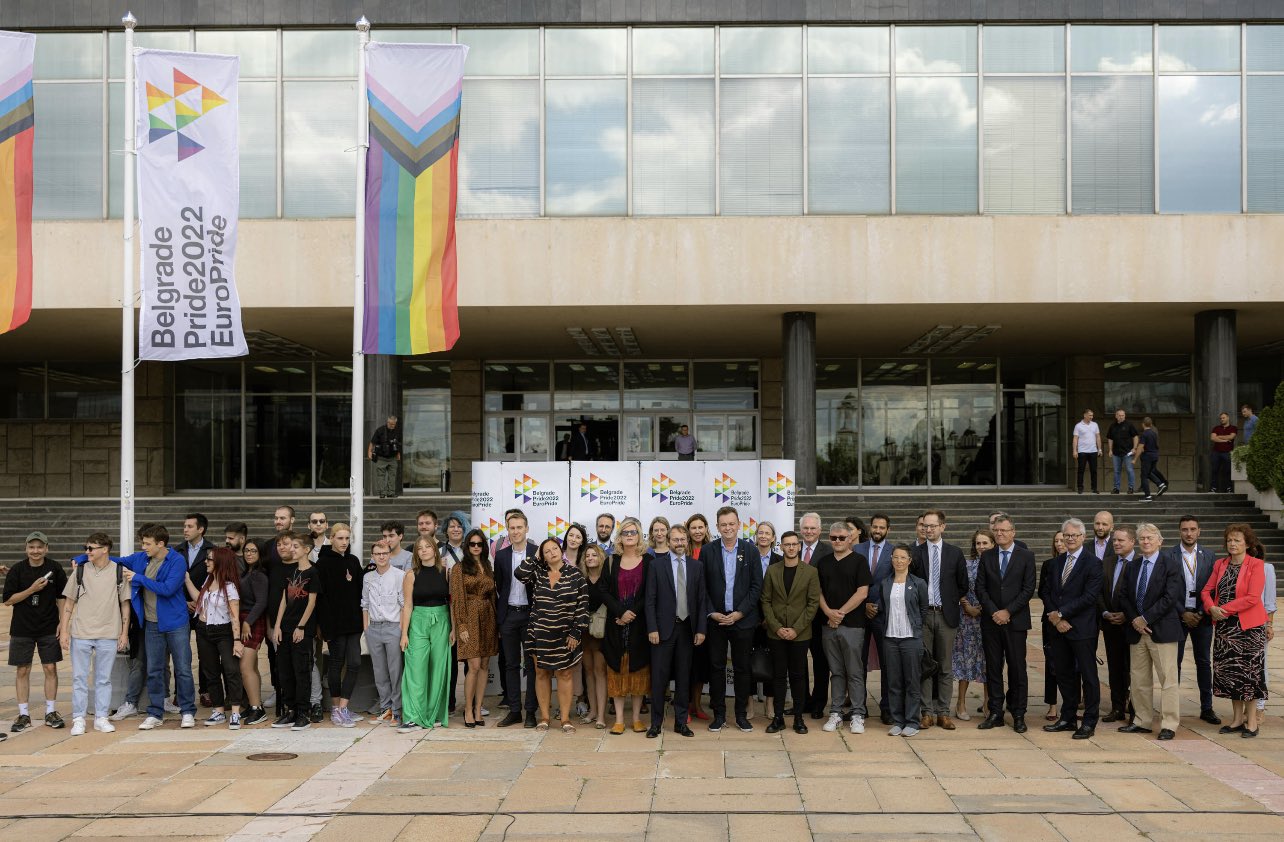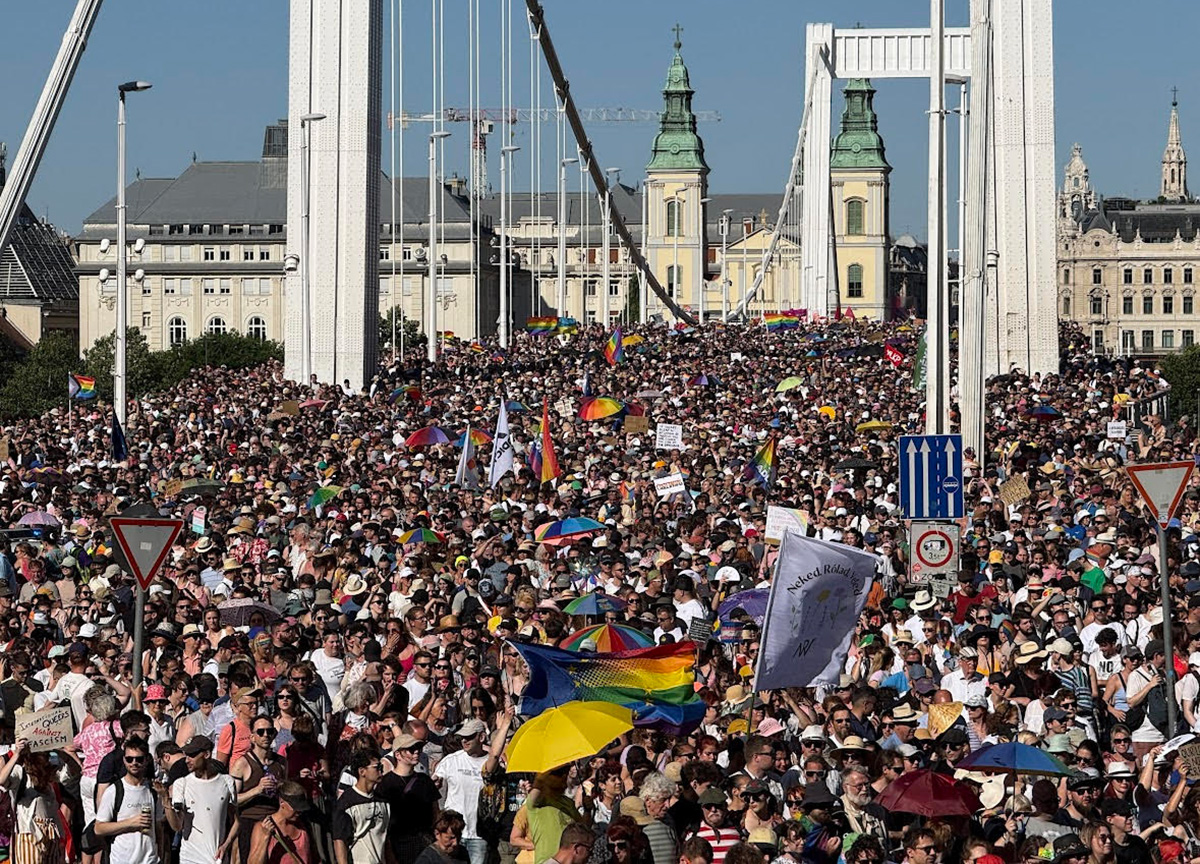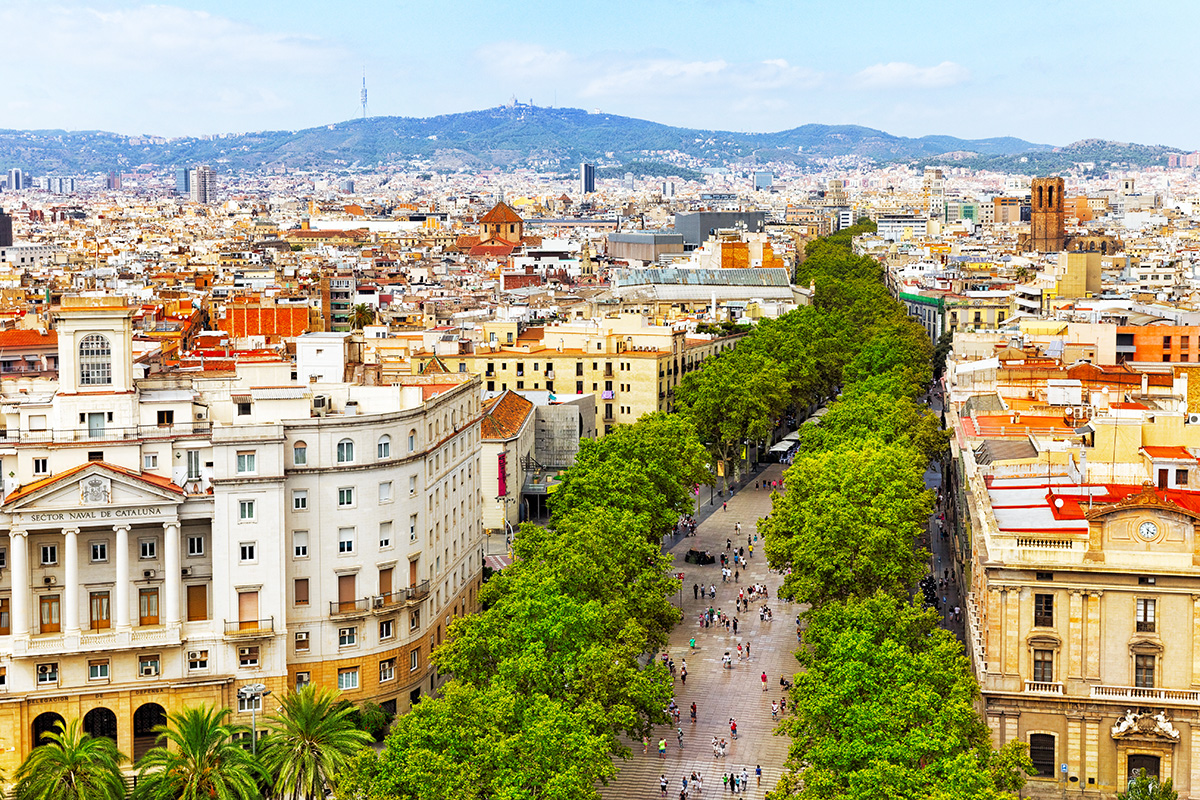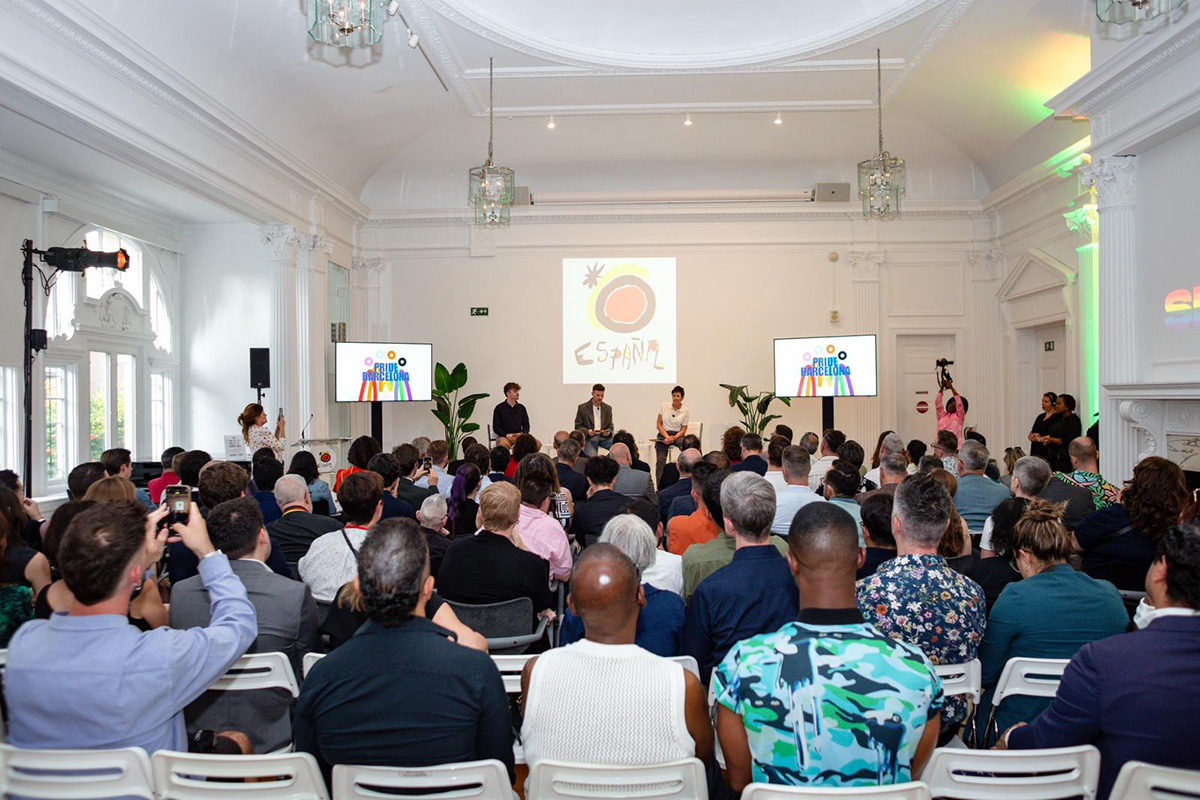Europe
EuroPride begins in Serbia amid far-right protests
Country’s president on Tuesday announced march is banned

Officials from EuroPride and Belgrade Pride commemorated the start of EuroPride 2022 in the Serbian capital with a ceremonial flag raising Monday as the event gets underway this week.
Concerns however, have been raised over safety for attendees and participants in the wake of massive anti-LGBTQ demonstrations and the government of Serbia issuing a ban.
During a routine Saturday press conference two weeks ago, Serbian President Aleksandar Vucic announced that the international EuroPride event scheduled to be held from Sept. 12-18 was cancelled.
In his remarks the Serbian leader told reporters that his government had come under intense pressure from far right-wing groups and the leadership of the Serbian Orthodox Church to cancel the event. Vucic acknowledged that LGBTQ rights and people in the Balkan nation were under siege and threatened. However he deflected on the issue, “It is not a question of whether [those pressures] are stronger,” he said. “It’s just that at some point you can’t achieve everything, and that’s it.”
Undaunted, EuroPride and Belgrade Pride defiantly announced that the event would go on as scheduled.
“President Vucic cannot cancel someone else’s event. EuroPride is not cancelled, and will not be cancelled,” European Pride Organizers Association President Kristine Garina said.
“During the bidding process for EuroPride 2022, (the) prime minister of Serbia, Ana Brnabic promised the full support of the Serbian government for EuroPride in Belgrade, and we expect that promise to be honored,” she added.
The kick-off was also attended by U.S. Ambassador to Serbia Christopher R. Hill who tweeted:
“Gratified to see a safe, secure start to #EuroPride2022. Congratulations @BelgradePride, @CDREurope, and the entire team of organizers behind @EuroPride. Looking forward to a week of great events with safety, security, and basic freedoms guaranteed for all.”
Gratified to see a safe, secure start to #EuroPride2022. Congratulations to @BelgradePride, @CDREurope, and the entire team of organizers behind @EuroPride. Looking forward to a week of great events with safety, security, and basic freedoms guaranteed for all. pic.twitter.com/H3JtUK6xEA
— Ambassador Christopher R. Hill (@usambserbia) September 12, 2022
On Sunday, several thousands of protesters took to the streets of Belgrade, many carrying huge Serbian and Russian flags, chanting pro-Russia, pro-Vladimir Putin and anti-LGBTQ slogans and marching to Belgrade’s St. Sava cathedral for prayers.
Serbian Orthodox Church Patriarch Porfirije led clerics and faithful in a prayer “for the sanctity of marriage and family” that accused “invisible forces” of imposing “ungodly and unnatural unions as a substitute for marriage and family.”
Radio Free Europe/Liberty reported that Brnabic, who is openly lesbian and was a participant in a 2017 Pride event in Belgrade, declined to intervene to support holding the EuroPride events in light of the ban decreed by Vucic.
She responded angrily on Monday to a local newspaper editor who accused Brnabic of selling out the LGBTQ community to become a “Progressive,” a reference to Vucic’s Serbian Progressive Party, which she joined after becoming prime minister as an independent five years ago.
Brnabic accused the editor and other “enlightened elites” of cubbyholing gay people as incapable of holding diverse political views.
“[To them] if you’re gay, you can only be gay, period. It’s the only thing that defines you,” Brnabic tweeted. “You are not the prime minister — but LGBT.”
The translation of the tweet below reads: “The essence of discrimination that the “enlightened elite” neither sees nor cares about. If you’re gay, you can just be gay, period. It’s the only thing that defines you. You are not the prime minister — but LGBT. You are not a member of SNS — but LGBT. And they don’t see a single problem with it, they think it’s something smart.”
Суштина дискриминације коју нити види “просвећена елита” нити их то интересује. Ако си геј, можеш да будеш само геј и тачка. То је једино што те дефинише. Ниси премијер – него ЛГБТ. Ниси члан СНС – него ЛГБТ. И не виде ни један проблем у томе, већ мисле да је то нешто паметно. 🤔 pic.twitter.com/DbEN1xMLGk
— Ana Brnabic (@anabrnabic) September 12, 2022
There has been violence at previous Pride events being held in the Serbian capital city, most notably on Oct. 10, 2010, when anti-LGBTQ and ultra nationalist anti-government protesters fought with about 5,000 armed Serbian police resulting in 78 police officers and 17 civilians that were injured some seriously and more than 100 arrests and detentions.
The violence also severely damaged the car-park building of the ruling pro-European Democratic Party in an act of arson, the state television building and the headquarters of other political parties were also damaged.
The rioting came as Serbia was seeking admittance as a European Union member state.
A spokesperson for the ILGA-Europe said that since 2014 Pride events were held in Belgrade under mostly peaceful conditions, but there is extreme pushback from the ultra-nationalist groups and especially those groups aligned with the Orthodox Church.
On Tuesday, the European Union’s Office of the Commissioner for Human Rights, Dunja Mijatović, issued a statement regarding Serbia’s stance on EuroPride and the ban by Vucic:
“It is highly regrettable that the Serbian authorities have decided to ban the EuroPride march scheduled for Sept. 17. Weeks of uncertainty concerning the holding of this march have sent a wrong message to the public and made space for hateful rhetoric and more threats against LGBTI people, including from religious leaders,” said Mijatović.
“Instead of bowing to threats and hate by banning the EuroPride march, the Serbian authorities have the responsibility to ensure that everyone in society can exercise their right to enjoy the same freedoms and is equal in dignity.” Mijatović noted continuing:
“As I have stressed in my conversations with the Serbian authorities at the highest level over the past two weeks, the fact that EuroPride takes place in Serbia this week is also of great significance for the south-eastern European region, where much still needs to be done to combat discrimination and hate against LGBTI people. Hosting EuroPride sends the signal that the march toward equality is in progress. It is positive that Pride marches have taken place peacefully in recent years in Belgrade, Sarajevo, Tirana, Podgorica and Skopje and I call on the Serbian authorities to be on the right side of history by enabling a peaceful and safe EuroPride march next Saturday.”
Hungary
Upwards of 100K people march in Budapest Pride
Participants defined Hungarian government’s ban on public LGBTQ events

More than 100,000 people on Saturday defied the Hungarian government’s ban on public LGBTQ events and participated in the 30th annual Budapest Pride parade.
The New York Times published a picture that shows throngs of people marching on Budapest’s Erzsébet Bridge over the Danube River. Openly gay MEP Krzysztof Śmiszek, who was previously Poland’s deputy justice minister, is among the dozens of European lawmakers who participated in the march that began at Budapest City Hall.
The New York Times reported Hungarian police officers stood along the march, but they did not try to stop it. Śmiszek described the march to the Washington Blade as “beautiful and huge.”
“[It was] very peaceful and political,” he said.
Prime Minister Viktor Orbán and his Fidesz-KDNP coalition government have faced widespread criticism over its anti-LGBTQ crackdown.
Hungarian lawmakers in March passed a bill that bans Pride events and allow authorities to use facial recognition technology to identify those who participate in them. MPs in April amended the Hungarian constitution to ban public LGBTQ events.
Budapest Mayor Gergely Karácsony endorsed the march, even though Orbán’s government threatened to arrest him and fine participants.
“Today a country shows that no ruling party can tell it on what topic, for what cause it is allowed to march and why not,” said Budapest Pride President Viktória Radványi on Saturday in a Facebook post. “A country demonstrates that whoever will be in government can count on us: dedicated, persistent citizens intolerant to oppression, who will organize themselves and stand against tyranny with their heads held high.”
More than two dozen activists in D.C. who protested outside the Hungarian Embassy on Friday expressed their support for Budapest Pride.
(Washington Blade video by Michael K. Lavers)
District of Columbia
Activists protest outside Hungarian Embassy in DC
Budapest Pride scheduled to take place Saturday, despite ban

More than two dozen activists gathered in front of the Hungarian Embassy in D.C. on Friday to protest the country’s ban on Budapest Pride and other LGBTQ-specific events.
Amnesty International USA Executive Director Paul O’Brien read a letter that Dávid Vig, executive director of Amnesty International Hungary, wrote.
“For 30 years Budapest Pride has been a celebration of hope, courage, and love,” said Vig in the letter that O’Brien read. “Each march through the streets of Budapest has been a powerful testament to the resilience of those who dare to demand equality, but a new law threatens to erase Pride and silence everyone who demands equal rights for LGBTI people.”
“The Hungarian government’s relentless campaign against LGBTI rights represents a worrying trend that can spread normalizing division and hatred,” added Vig. “Thank you for standing with us when we refuse to be intimidated.”
Council for Global Equality Chair Mark Bromley and two of his colleagues — Stephen Leonelli and Keifer Buckingham — also spoke. Health GAP Executive Director Asia Russell and Chloe Schwenke, a political appointee in the Obama-Biden administration who worked for the U.S. Agency for International Development, and Planned Parenthood staffers are among those who attended the protest.
(Washington Blade video by Michael K. Lavers)
Hungarian lawmakers in March passed a bill that bans Pride events and allow authorities to use facial recognition technology to identify those who participate in them. MPs in April amended the Hungarian constitution to ban public LGBTQ events.
Budapest Pride is scheduled to take place on Saturday, despite the ban. Hundreds of European lawmakers are expected to participate.
“Sending strength to the patriotic Hungarians marching tomorrow to advance human dignity and fundamental rights in a country they love,” said David Pressman, the gay former U.S. Ambassador to Hungary, on Friday on social media.
Sending strength to the patriotic Hungarians marching tomorrow to advance human dignity and fundamental rights in a country they love. Szabadság és szerelem. My past remarks on Budapest Pride: https://t.co/y1QhA9QouA
— David Pressman (@AmbPressman) June 27, 2025
Spain
Barcelona bids to host WorldPride in 2030
Activists from Spanish city traveled to D.C. this month

A group of activists from Barcelona traveled to D.C. earlier this month to promote their city’s bid to host WorldPride in 2030.
Pride Barcelona Vice President Maria Giralt, WorldPride Barcelona 2030 Project Manager Andoni Ibáñez, and Pride Barcelona’s Roger Presseguer on June 4 presented the city’s bid at a José Andrés-catered event at the Spanish Cultural Center in Northwest Washington.

Catalonia LGBTI+ Public Policies General Director Alberto Lacasta, Barcelona City Commissioner Javier Rodríguez, and Barcelona Turisme Director Rosa Bada traveled to D.C. with the activists. Giralt, Ibáñez, and Presseguer visited the Washington Blade’s office on June 6.
“We intended to transmit the spirit of our candidacy,” said Giralt.
Giralt noted 39 LGBTQ groups in Barcelona and throughout Catalonia support the bid. The Catalonian government and Spain’s Tourism Institute, known as Turespaña, have also backed it.
“Spain and the ministry have helped us a lot,” said Giralt.
Madrid, the Spanish capital, hosted WorldPride in 2017. The activists’ trip to D.C. coincided with WorldPride 2025 that took place in the nation’s capital.
Spanish Sen. Carla Antonelli, who is transgender, is among those who participated in the WorldPride 2025 Human Rights Conference. Turespaña also had a booth at the Capital Pride Festival.
Next year’s WorldPride will take place in Amsterdam, while Cape Town will host WorldPride 2028. Montreal, London, and Bangkok are the three other cities that have bid to host WorldPride 2030.
InterPride, the organization that coordinates WorldPride events, will announce the winning bid in 2026.
“What better occasion than to come to Washington to present (the bid) and to also connect with other countries around the world,” said Giralt. “This approval is very important, especially at this time when there is a wave, a drift, toward the extreme right, and we believe it is very important for all the world’s greats to be present, to be clear that the fight. The resistance must continue.”
Spain’s first LGBTQ rights march took place in Barcelona on June 26, 1977, less than two years after long-time dictator Gen. Francisco Franco died. Spain is now one of the world’s most LGBTQ-friendly countries.
“What we’re trying to do from Barcelona is to recover a little of this struggle’s origins,” Giralt told the Blade.
‘A historic moment to be in Washington’
WorldPride 2025 took place less than five months after the Trump-Vance administration took office.
Egale Canada, one of Canada’s largest LGBTQ advocacy organizations, in February announced its members would not participate in WorldPride or any other event in the U.S. because of the White House’s policies. Equality Australia in April issued a travel advisory for transgender and nonbinary people who plan to visit the U.S. in response to President Donald Trump’s executive order that directed the federal government to recognize only “two genders, male and female” and banned the State Department from issuing passports with “X” gender markers.
Phyll Opoku-Gyimah, the co-founder of UK Black Pride known as Lady Phyll, spoke at the WorldPride 2025 Human Rights Conference’s opening plenary virtually after the U.S. revoked her eligibility to enter the country without a visa because she had traveled to Cuba earlier this year.
The U.S. Customs and Border Protection website notes the State Department on Jan. 12, 2021, designated Cuba as a state sponsor of terrorism. The CBP website notes that with “limited exceptions, a traveler who is found to have visited Cuba on or after this date is not eligible for travel under the Visa Waiver Program (VWP) using an Electronic System for Travel Authorization (ESTA) and must apply for a visa to travel to the United States.”
Ibáñez told the Blade that he, Giralt, and Presseguer felt it was important for them to travel to the U.S. for WorldPride.
“We feel that it was a historic moment to be in Washington celebrating and fighting for our rights within the context of Trump,” said Ibáñez.
“It was very important for us to come here and share our values and claim next to your (White House) and say, hey, we’re here and we’re never going to go away,” added Ibáñez.




















